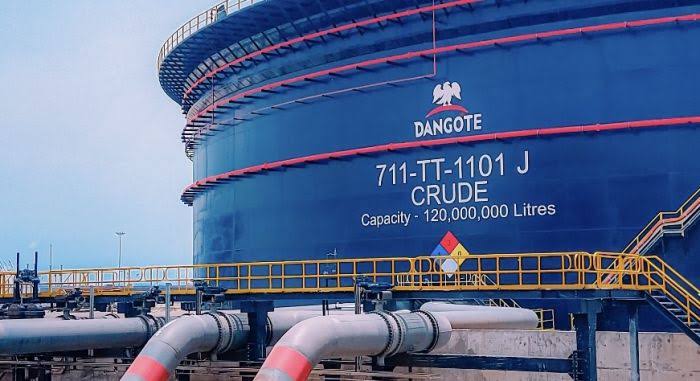The Dangote Petroleum Refinery is building eight more tanks in its bid to have enough storage for imported crude oil.
A report by Africa Report has it that the refinery is ramping up its storage capacity by 6.29 million barrels, equivalent to 1 billion litres.
The report stated that the $20bn refinery is planning to stockpile imported crude oil as local supplies became unreliable.
Officials of the refinery were quoted as saying that low crude supply from the Nigerian National Petroleum Company Limited “is driving import dependence.”
The building of eight additional tanks will see crude storage capacity at the $20bn refinery jump by 41.67 per cent to 3.4 billion litres.
“Importing crude from other countries instead of buying locally means that our crude stockpiles will have to be higher,” the Vice President in charge of oil and gas business at Dangote Industries, Devakumar Edwin, was quoted as having said.
“So we have started building eight additional crude tanks to hold a billion litres, over and above our original storage capacity. Four of them are nearing completion,” Edwin added.
The refinery currently has 20 crude storage tanks with a capacity of 120 million litres each, totalling 2.4 billion litres.
Its refined product tanks have a total capacity of 2.34 billion litres.
Dangote began producing diesel and aviation fuel in January 2024, and petrol in September, with products supplied to the domestic market and exported to several countries.
Edwin described the supply of crude oil from the NNPC to the Dangote refinery as “still very low”.
Nigeria, which is Africa’s biggest oil producer, was importing its fuels until last year when the Dangote refinery came on stream.
Today, the NNPC’s Warri and Port Harcourt refineries have resumed operations, indicating that the company would have to supply crude to the two facilities aside from the percentage committed to servicing its loans.
Nigeria has continued to contend with underinvestment and production outages caused largely by theft and pipeline vandalism, which have seen it lose its top spot in Africa several times in recent years.
However, the Nigerian Upstream Petroleum Regulatory Commission said last month that crude is 1.45 million barrels per day as of November, 99 per cent of its 1.5mbpd OPEC quota.
The PUNCH reports that Dangote’s decision to expand storage facilities for imported crude could be an indication that the naira-for-crude deal ordered by President Bola Tinubu might be fading out gradually.
Before President Bola Tinubu ordered the sale of crude to Dangote refinery in August, the facility had battled months of crude shortage.
The President of the Dangote Group, Alhaji Aliko Dangote, accused international oil companies of plans to sabotage the refinery by refusing to supply crude oil.
On July 29, the Federal Executive Council approved a proposal by Tinubu for the NNPC to sell crude oil to local refineries in naira.
It approved that the 450,000 barrels meant for domestic consumption be offered in naira to the refineries, using the Dangote refinery as a pilot.
The implementation of the initiative started on 1 October, with the NNPC expected to commence the supply of about 385,000 bpd of crude oil to the Dangote refinery to be paid for in naira.
Aliko Dangote, president of Dangote Industries, said in December that the naira-for-crude deal has led to a reduction in prices of petroleum products in the country
At the moment, the Dangote refinery is ramping up production as its petrol gathers momentum among Nigerian vehicle owners.

